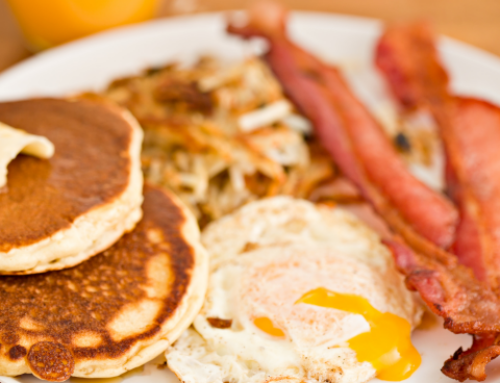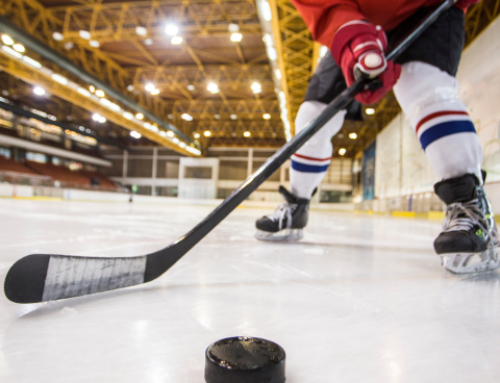Restaurant Eating Guidelines
Eating right in restaurants is as crucial as eating right at school or home. So next time you’re out, forget the shake and fries and heed restaurant eating advice from Jane Jakubczak, coordinator of nutrition services for the University of Maryland, College Park.
Pre-activity
Night before
Jakubczak recommends filling up with a balanced meal of carbohydrates and lean protein. The best restaurant carbs, which serve as food for your muscles, include rice, bread, couscous or pasta with marinara. Avoid cream-based sauces, like Alfredo, because they weigh you down, hindering your athletic performance.
For lean protein, go for roasted, baked or grilled items. Jakubczak says fish is a good choice, as well as barbeque chicken breast without the skin—a tasty alternative to grilled chicken and much healthier than fried chicken. Add a salad with dressing on the side so you can drizzle on just enough to make it palatable.
One thing you shouldn’t skimp on is water, because proper hydration on a daily basis is essential for optimal athletic performance. A recent study published in Medicine & Science in Sports & Exercise found that dehydration hinders shot accuracy and slows movement for basketball players.
Want something more flavorful to drink? Jakubczak suggests unsweetened iced tea or 100 percent fruit juice as good alternatives. Craving soda instead? Order diet. “It’ll give you some fluid without filling you up with a lot of sugar,” she says. Still, put it fourth on the list of beverages.
Finally, if you must indulge in dessert, Jakubczak advises, “the best thing to do is share with one of your teammates.”
Post-activity
30 minutes after
Post-activity fuel is especially vital if you’re playing in a weekend tourney, or if you have more intense training ahead. “Make sure to eat something as soon as possible, because this meal will be the resource to muscle rebuilding and recovery,” Jakubczak explains.
She says a recovery drink is the perfect way to start refueling, especially if you have to wait in a long restaurant line. Not only is it portable [just throw one in your gym bag], it’s an immediate way to reload your body’s glycogen stores. Drink one within 30 minutes of activity, because that’s the optimal recovery window.
Jakubczak recommends following that up with a protein-rich meal. If you’re at a fast food joint, chow down on a grilled chicken wrap or a lean hamburger, holding off on high-fat toppings such as bacon and extra cheese. Though cheese is a good source of calcium and protein, she warns it’s also high in saturated fat, like fried and batter-dipped foods.
Make sure to include carbs in your post-activity dish. If your burger comes with fries, Jakubczak suggests substituting a baked potato. Depending on your caloric needs, you can add fruit salad or a cup of chili. One third of the meal should be carb-rich foods and another third should be a fruit or vegetable. “You need the whole balance,” Jakubczak says.
Nutrition Totals*:
PRE-WORKOUT
Calories 970
Protein 65g
Fat 20g
Carbohydrates 100g
*For 6 oz. bbq chicken breast, 1C rice pilaf, 2C garden salad w/ 2 oz. balsamic vinaigrette dressing, 1 large dinner roll, 24 oz. unsweetened ice tea
POST-WORKOUT
Calories 840
Protein 44g
Fat 14.5g
Carbohydrates 137g
*For GNC Pro Performance Sports Smoothie Protein Drink, Wendy’s Jr. Hamburger, baked potato with broccoli
RECOMMENDED FOR YOU
MOST POPULAR
Restaurant Eating Guidelines
Eating right in restaurants is as crucial as eating right at school or home. So next time you’re out, forget the shake and fries and heed restaurant eating advice from Jane Jakubczak, coordinator of nutrition services for the University of Maryland, College Park.
Pre-activity
Night before
Jakubczak recommends filling up with a balanced meal of carbohydrates and lean protein. The best restaurant carbs, which serve as food for your muscles, include rice, bread, couscous or pasta with marinara. Avoid cream-based sauces, like Alfredo, because they weigh you down, hindering your athletic performance.
For lean protein, go for roasted, baked or grilled items. Jakubczak says fish is a good choice, as well as barbeque chicken breast without the skin—a tasty alternative to grilled chicken and much healthier than fried chicken. Add a salad with dressing on the side so you can drizzle on just enough to make it palatable.
One thing you shouldn’t skimp on is water, because proper hydration on a daily basis is essential for optimal athletic performance. A recent study published in Medicine & Science in Sports & Exercise found that dehydration hinders shot accuracy and slows movement for basketball players.
Want something more flavorful to drink? Jakubczak suggests unsweetened iced tea or 100 percent fruit juice as good alternatives. Craving soda instead? Order diet. “It’ll give you some fluid without filling you up with a lot of sugar,” she says. Still, put it fourth on the list of beverages.
Finally, if you must indulge in dessert, Jakubczak advises, “the best thing to do is share with one of your teammates.”
Post-activity
30 minutes after
Post-activity fuel is especially vital if you’re playing in a weekend tourney, or if you have more intense training ahead. “Make sure to eat something as soon as possible, because this meal will be the resource to muscle rebuilding and recovery,” Jakubczak explains.
She says a recovery drink is the perfect way to start refueling, especially if you have to wait in a long restaurant line. Not only is it portable [just throw one in your gym bag], it’s an immediate way to reload your body’s glycogen stores. Drink one within 30 minutes of activity, because that’s the optimal recovery window.
Jakubczak recommends following that up with a protein-rich meal. If you’re at a fast food joint, chow down on a grilled chicken wrap or a lean hamburger, holding off on high-fat toppings such as bacon and extra cheese. Though cheese is a good source of calcium and protein, she warns it’s also high in saturated fat, like fried and batter-dipped foods.
Make sure to include carbs in your post-activity dish. If your burger comes with fries, Jakubczak suggests substituting a baked potato. Depending on your caloric needs, you can add fruit salad or a cup of chili. One third of the meal should be carb-rich foods and another third should be a fruit or vegetable. “You need the whole balance,” Jakubczak says.
Nutrition Totals*:
PRE-WORKOUT
Calories 970
Protein 65g
Fat 20g
Carbohydrates 100g
*For 6 oz. bbq chicken breast, 1C rice pilaf, 2C garden salad w/ 2 oz. balsamic vinaigrette dressing, 1 large dinner roll, 24 oz. unsweetened ice tea
POST-WORKOUT
Calories 840
Protein 44g
Fat 14.5g
Carbohydrates 137g
*For GNC Pro Performance Sports Smoothie Protein Drink, Wendy’s Jr. Hamburger, baked potato with broccoli











